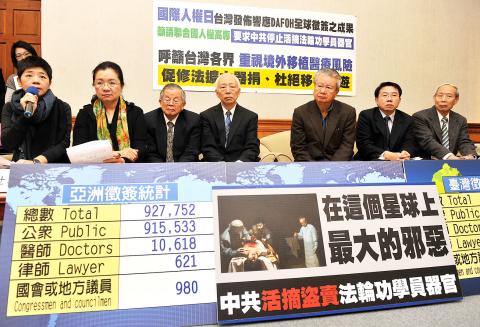A petition initiated by Doctors Against Forced Organ Harvesting to stop the practice in China has garnered more than 230,000 signatures in Taiwan, lawmakers and activists said on Human Rights Day yesterday.
The appeal to the UN Human Rights High Commissioner was started in the middle of June and calls for an “immediate end of forced organ harvesting from Falun Gong practitioners in China.”
As of the end of last month, nearly 1.5 million people around the world have signed the petition, including about 1 million from Asia.

Photo: Chien Jung-fong, Taipei Times
Democratic Progressive Party (DPP) Legislator You Mei-nu (尤美女) said that Taiwan is a nation governed by human rights principles and Taiwanese, who are guaranteed the right to health, should not “build their wellbeing on somebody else’s sorrow or pain.”
“China has been the main destination of Taiwanese needing organ transplants. However, we have to be aware that a lot of the organs used for transplants in China are sourced from prisoners of conscience and imprisoned Falun Gong practitioners... The public has the right to know and the transparency of relevant information should be enforced by our government,” she said.
DPP Legislator Tien Chiu-chin (田秋堇) said Taiwanese are blessed today because they enjoy the product of their predecessors’ struggle for freedom from fear and for free speech.
“They are like the air. People don’t sense their presence until they are taken away, ” she said.
“I’ve personally seen a Falun Gong practitioner calling a hospital in China and getting the response that a patient in need can undertake the matching process needed for an organ transplantation any time,” she added. “It makes people suspect that there exists an organization that operates like an organ supermarket.”
International Care Association of Organ Transplants chairman Hu Nai-wen (胡乃文) said the Chinese government has failed to explain the discrepancy between the number of organ transplants performed in China and the number of executed prisoners, which it identified as the source of the organs.
Tien said she had proposed, unsuccessfully, to deny National Health Insurance coverage for anti-rejection medications to those who did not fill out a form stating the name of the hospital and the surgeon who performed the organ transplant.
“People are asked to fill out the form for the coverage, but there is no punishment if you fail to comply,” Tien said.
Responding to the lawmakers’ and groups’ concerns, Ministry of Health and Welfare’s Department of Medical Affairs Director Lee Wei-chiang (李偉強) said the government does not encourage overseas organ transplantations due to the medical risk and questions about the source of the organs.
“The number of Taiwanese who went to China for organ transplants has been decreasing over the years. And there is a consensus that organs donated by prisoners should not be accepted,” Lee said.
He added that the ministry has proposed an amendment to the Human Organ Transplant Act (人體器官移植條例), which would make brokering organ transplants a crime subject to one to five years in prison.

US President Donald Trump said "it’s up to" Chinese President Xi Jinping (習近平) what China does on Taiwan, but that he would be "very unhappy" with a change in the "status quo," the New York Times said in an interview published yesterday. Xi "considers it to be a part of China, and that’s up to him what he’s going to be doing," Trump told the newspaper on Wednesday. "But I’ve expressed to him that I would be very unhappy if he did that, and I don’t think he’ll do that," he added. "I hope he doesn’t do that." Trump made the comments in

NOT AN OPENING: Trump’s violation of international law does not affect China’s consideration in attacking Taiwan; Beijing lacks capability, not precedent, an official said Taiwanese officials see the US’ capture of the president of Venezuela as a powerful deterrent to Beijing’s aggression and a timely reminder of the US’ ability to defeat militaries equipped with Chinese-made weapons. The strikes that toppled Venezuelan President Nicolas Maduro signaled to authoritarian leaders, including Chinese President Xi Jinping (習近平), US President Donald Trump’s willingness to use military might for international affairs core to US interests, one senior official in Taipei’s security circle said. That reassured Taiwan, the person said. Taipei has also dismissed the idea that Trump’s apparent violation of international law could embolden Beijing, said the official, who was not

A cold surge advisory was today issued for 18 cities and counties across Taiwan, with temperatures of below 10°C forecast during the day and into tonight, the Central Weather Administration (CWA) said. New Taipei City, Taipei, Taoyuan and Hsinchu, Miaoli and Yilan counties are expected to experience sustained temperatures of 10°C or lower, the CWA said. Temperatures are likely to temporarily drop below 10°C in most other areas, except Taitung, Pingtung, Penghu and Lienchiang (Matsu) counties, CWA data showed. The cold weather is being caused by a strong continental cold air mass, combined with radiative cooling, a process in which heat escapes from

Snow this morning fell on Alishan for the first time in seven years, as a strong continental cold air mass sent temperatures plunging across Taiwan, the Central Weather Administration (CWA) said. The Alishan weather station, located at an elevation of about 2,200m in central Taiwan, recorded snowfall from 8:55am to 9:15am, when the temperature dropped to about 1°C, the CWA said. With increased moisture and low temperatures in the high-altitude Alishan area, the conditions were favorable for snow, CWA forecaster Tsai Yi-chi (蔡伊其) said. The last time snow fell at the Alishan weather station was on Jan. 10, 2018, while graupel fell there